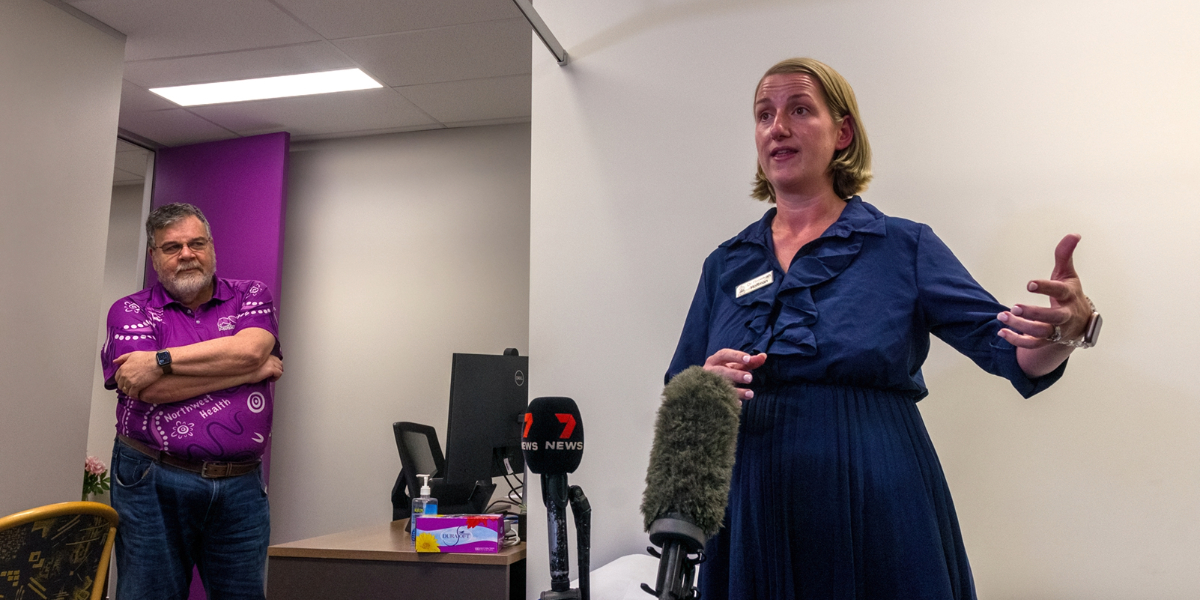Royal Australian College of General Practitioners (RACGP) New South Wales and ACT Chair, Dr Rebekah Hoffman, stopped off at Tamworth’s Urgent Care Clinic yesterday as part of her tour of New England in support of regional and rural medicine.
Speaking at the Tamworth Urgent Care Clinic at Northwest Health in East Tamworth alongside New South Wales/ACT Representative to the RACGP’s Rural Council, Dr. Ian Kamerman, Dr Hoffman talked about the shortage of medical staff in rural and regional areas, the need for better patient rebates for long-term care, and for GPs to be given wider roles in healthcare.
“What we’re hearing on this tour is workforce, workforce, workforce,” Dr. Hoffman said.
“We need more doctors regionally and really, and we’re working on a solution to get more here.”
Dr. Hoffman’s tour came just ahead of the “big announcement” in the budget that the Federal government would be increasing the number of GPs trained in Australia by a third.
“We’re going to be training 500 more Australian GPs every year, from next year out to 2025, so that’s 2000 GPs up from 1500 currently,” Dr. Hoffman said, hopeful that would mean more doctors for regional areas.
“We’re hoping that we put them into areas of workforce need, so we’re going to be placing our registrars into areas like here, because we know we need workforce here.”
Dr. Hoffman said doctors in Armidale and Tamworth had little reason to leave – it’s getting them here in the first place that’s the problem.
“I think there’s a lot to the area that’s really attractive – when we talk about regional areas, we talk about schools, we talk about childcare, we talk about having places for their partners to work.”
“We talk about GPs marrying local farmers, which isn’t a solution for every GP, but it is an excellent solution for rural retention…for some,” Dr. Hoffman, who hails from the Sutherland Shire, added.
Both Tamworth and Armidale rated highly for liveability, in terms of facilities, job opportunities, and housing, but also stated that more training ought to be done in rural areas where the qualified doctors are needed.
“What we’d love to see is students do medical school here, to do their junior doctor years here, and then become a GP or cardiologist or paediatrician, or whatever, here.”
Shortage of specialists could be dealt with by allowing GPs to take on roles that are currently only done by certain specialties, which is one plan that Dr. Hoffman said the RACGP has shared with the Health and Finance Ministers. The proposal is that GPs be allowed to treat things like ADHD or cystic acne, both of which are common conditions that requires different specialists not generally available in rural areas.
Regular FIFO clinics, with the same doctors for continuity of care, were also mentioned as a solution, and Dr. Hoffman said “there should be State Government solutions to that”.
Dr. Kamerman, who operates the Urgent Care Clinic in Tamworth, which sees “around 50 odd” patients a day on Marius Street, pleaded for more funding.
“I would like larger rebates for the longer item numbers – the longer consultations we do,” Dr. Kamerman said.
“I think the biggest thing we’ve had to get over is the Medicare freeze that lasted a decade, and essentially it’s done a lot to destroy general practice and reduce the numbers that are coming through into general practice.”
Tamworth was running a deficit of about 30 GPs according to Dr. Kamerman.
“Tamworth’s got a population catchment of around 70,000 people.
“That means we need roughly 70 to 75 GPS, and I think there’s probably only about 45 here.”
One of the biggest problems regional areas faced, Dr. Kamerman said, was the difficulty for international doctors to set up outside of the capitals.
“One of the biggest issues that we face, considering that more than 50% of GPs in Australia are from an international background, is their loss of their cultural heritage, their connection with colleagues and friends that come from the same background, the opportunity to bring up their children also within that same culture is a significant issue for many people looking at working in rural area.”
Got something you want to say about this story? Have your say on our opinion and comment hub, New England Times Engage


